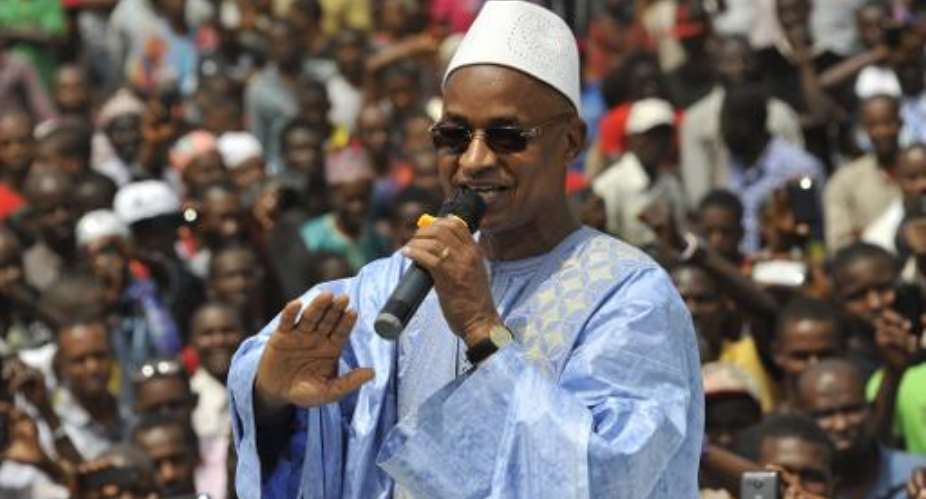Conakry (AFP) - Guinean security forces took to the streets of the capital in huge numbers on Monday as anti-government activists staged fresh protests following deadly clashes between demonstrators and police last week.
Hundreds of youths barricaded roads across Conakry, burning tyres, and there were brief, isolated clashes as police responded with tear gas.
The government said in a statement a trainee policeman had been seriously wounded by protesters, apparently having been shot, adding that the demonstrations had caused extensive damage and led to two arrests.
Former prime minister Sidya Toure, of the Union of Republican Forces (UFR), claimed "another very successful day for the opposition, which has paralysed the entire city".
UFR officials said police had fired tear gas at their headquarters as the protests got underway.
"As soon as demonstrations start in Conakry they always start by hitting the UFR headquarters with tear gas to prevent us from mobilising and going out," Toure told AFP.
He said the authorities were desperate to avoid demonstrations on the nearby Fidel Castro highway because "if this route is blocked as well as the Prince highway, it's finished for Conakry".
Pro-government demonstrators threw stones at the UFR building while the police stood by, a party official claimed.
Conakry governor Soriba Sorel Camara had earlier said in a statement read out on state television that he expected the Guinean opposition would be "throwing stones, dumping garbage and burning tyres on public roads".
- 'We should be afraid' -
He made a point of mentioning that the protests were going ahead despite Conakry still battling an Ebola outbreak. Although the epidemic is receding, the city is still reporting a handful of new cases each week.
He called on residents of the city of two million people to "go about their usual activities" and said the state would "take all measures" to ensure their safety and secure their property.
The Prince highway, the main route from the suburbs into central Conakry, usually choked with traffic, was almost deserted, with shops, petrol stations and schools remaining closed.
"We have to take precautions because the country is no longer safe. Every day there are demonstrations, violence in the capital," said Macire Camara, a stallholder in the Kaloum business district.
"And if in the coming week it spreads across the country, we should be afraid."
A Guinean government delegation headed by Justice Minister Cheick Sako met opposition leader Cellou Dalein Diallo at his home for talks on Sunday.
"This step was intended to reiterate to the opposition the government's willingness to revive the dialogue -- the only route that ends with a calmer political climate and inclusive elections," a statement from the delegation said.
- 'The country will suffer' -
Diallo confirmed he had received the group of senior officials but emphasised that cancelling Monday's protests was "out of the question" without the guaranteed implementation of a 2013 agreement stipulating that local elections take place before a presidential contest announced for October.
Supporters of Diallo's Union of Democratic Forces of Guinea have protested over the electoral timetable, which they claim was pushed through without consultation and gives the ruling party an unfair advantage.
They are also angry about the fragile security situation in the west African nation, which they blame on President Alpha Conde's government.
Hundreds of youths hurled stones at police who responded with tear gas and warning shots in two days of violence on April 13 and 14.
The opposition said three people were killed, including an unidentified young girl, and 50 wounded -- at least 12 by gunfire -- during the clashes. The government put the number of dead at two, with "dozens" injured.
The meeting between Diallo and the delegation took place just hours after the funeral of one of the dead protesters.
Teacher Abdul Majid Barry urged the two sides to compromise, telling AFP Guinean youth faced another "lost year", just as the Ebola outbreak abates, "if each party continues to flex its muscles".
The opposition has accused Conde of using the Ebola epidemic as an excuse to postpone voting and is demanding that local elections due in March next year be brought forward.





 Whoever participated in the plunder of the state must be held accountable – Jane...
Whoever participated in the plunder of the state must be held accountable – Jane...
 A vote for John and Jane is a vote to pull Ghana from the precipice of destructi...
A vote for John and Jane is a vote to pull Ghana from the precipice of destructi...
 I’ll repay your abiding confidence with loyalty, understanding and a devotion to...
I’ll repay your abiding confidence with loyalty, understanding and a devotion to...
 ‘I’ve learnt deeply useful lessons for the future' — Serwaa Amihere breaks silen...
‘I’ve learnt deeply useful lessons for the future' — Serwaa Amihere breaks silen...
 I’m sorry for the embarrassment – Serwaa Amihere apologises for leaked sex video
I’m sorry for the embarrassment – Serwaa Amihere apologises for leaked sex video
 Dumsor: Matthew Opoku Prempeh not in charge of Energy sector – Minority
Dumsor: Matthew Opoku Prempeh not in charge of Energy sector – Minority
 Adu Boahen’s murder: Police arrest house help who was in possession of deceased’...
Adu Boahen’s murder: Police arrest house help who was in possession of deceased’...
 Akufo-Addo nominates Felicia Attipoe as Tema West MCE
Akufo-Addo nominates Felicia Attipoe as Tema West MCE
 Election 2024: I can't have someone I defeated twice as my successor – Akufo-Add...
Election 2024: I can't have someone I defeated twice as my successor – Akufo-Add...
